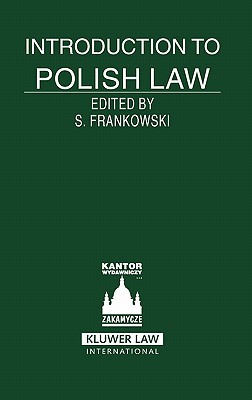

 |

|

Sold Out
Book Categories |
Preface,List of Abbreviations, Introduction 1. Constitutional Law (Lech Garlick) I. Introduction II. The Principles of the Political System III. Individual Rights and Freedoms IV. The Legislative Power V. The Executive Power: The President of the Republic VI. The Executive Power: The Council of Ministers, Central Government Administration and Local Self-Government VII. Concluding Observations 2. Civil Law (Law of Contracts, Property and Obligations) (Adam Brzozowski) I. Introduction II. General Provisions of the 1964 Code, Including the Law on Contracts III. Law of Property IV. Law of Obligations V. Concluding Observations 3. Family and Succession Law (Elzbieta Skowronska-Bocian) Part One: Family Law I. The Evolution of Polish Family Law II. Basic Concepts and Principles of Family Law III. Marriage IV. The Parent-Child Relationship V. Adoption VI. Support Duty Part Two: The Law of Succession I. General Principles II. Testamentary Succession III. Statutory Succession (Arts. 931-938 of the CC) IV. The Legal Status of Heirs V. Concluding Remarks 4. Civil Procedure (Tadeusz Erecinski) I. Introduction II. Fundamental Principles of Civil III. The Composition and Jurisdiction of Courts IV. Parties to Proceedings, Legal Representatives and Costs of Proceedings V. Types of Civil Suits VI. Law on Evidence in Civil Cases VII. Appellate Measures VIII. Enforcement of Civil Judgments IX. Jurisdiction of Polish Courts and Enforcement of Foreign Judgments in Poland X. Concluding Remarks 5. Administrative Law (Jacek Jagielski) I. Introduction II. Main Issues and Developmental Trends of Contemporary Administrative Law III. The System of Public Administration IV. Functioning of PublicAdministration V. Concluding Remarks 6. Economic Law (Cezary Banasinski, Remigiusz Kaszubski,Miroslaw Wyrzykowski) I. Introduction II. Constitutional Foundations of the Economy III. Commencing and Conducting Economic Activity IV. Regulatory Framework of Market Processes V. The Role of the State and Local Self-Government in the Economy VI. Concluding Remarks 7. Commercial Law (Dr. Lukasz Gasinski, Artur Nowacki,Jozef Okolski) I. Introduction II. Commercial Activities III. Companies Law IV. Capital Companies (Corporations) V. Law on Cooperatives VI. Bankruptcy Law VII. The Law on Public Trading in Securities VIII. The Bonds Act IX. The Ordinances on the Bills of Exchange and the Checks X. Concluding Observations 8. Labor Law (Ludwik Florek) I. Introduction II. Individual Labor Law III. Collective Labor Law IV. Concluding Observations 9. Intellectual Property
Login|Complaints|Blog|Games|Digital Media|Souls|Obituary|Contact Us|FAQ
CAN'T FIND WHAT YOU'RE LOOKING FOR? CLICK HERE!!! X
 You must be logged in to add to WishlistX
 This item is in your Wish ListX
 This item is in your CollectionIntroduction to Polish Law
X
 This Item is in Your InventoryIntroduction to Polish Law
X
 You must be logged in to review the productsX
 X
 X

Add Introduction to Polish Law, During two decades encompassing three epochal events - the collapse of European communism in 1989, NATO membership in 1999, and accession to the European Union in 2004 - the legal system of Poland has emerged with remarkable maturity and stability. In an , Introduction to Polish Law to the inventory that you are selling on WonderClubX
 X

Add Introduction to Polish Law, During two decades encompassing three epochal events - the collapse of European communism in 1989, NATO membership in 1999, and accession to the European Union in 2004 - the legal system of Poland has emerged with remarkable maturity and stability. In an , Introduction to Polish Law to your collection on WonderClub |